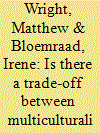|
|
|
Sort Order |
|
|
|
Items / Page
|
|
|
|
|
|
|
| Srl | Item |
| 1 |
ID:
113539


|
|
|
|
|
| Publication |
2012.
|
| Summary/Abstract |
Across immigrant-receiving democracies on both sides of the Atlantic, policies of "cultural recognition" (e.g., "multiculturalism") have become a convenient punching-bag for political elites. Among academics, heated theoretical debates exist over whether such policies foster or hinder immigrants' engagement with their adoptive nation. We provide a novel empirical assessment of this debate from the immigrant perspective. We ask how multicultural and citizenship policies influence immigrants' socio-political engagement with their adoptive nation in three realms: social inclusion, political inclusion, and political engagement. Using a variety of cross-national and single-country surveys, we show that multiculturalism in no case hinders engagement with society and government, and in many cases seems to foster it. Thus, the claim that multiculturalism undermines immigrants' socio-political integration appears largely without foundation.
|
|
|
|
|
|
|
|
|
|
|
|
|
|
|
|
| 2 |
ID:
167620


|
|
|
|
|
| Summary/Abstract |
Western societies have experienced a broadening of inclusive membership, whether we consider legal, interpersonal, or cultural membership. Concurrently, we have witnessed increased tensions around social citizenship, notably harsher judgments or boundaries over who “deserves” public assistance. Some have argued these phenomena are linked, with expanded, more diverse membership corroding solidarity and redistribution. We maintain that such a conclusion is premature and, especially, unsatisfactory: it fails to detail the processes–at multiple levels of analysis–behind tensions over membership and social citizenship. This essay draws on normative political theory, social psychology, cultural sociology, and political studies to build a layered explanatory framework that highlights the importance of individual feelings of group identity and threat for people's beliefs and actions; the significance of broader cultural repertoires and notions of national solidarity as a source and product of framing contests; and the diverse ways elites, power, and institutions affect notions of membership and deservingness.
|
|
|
|
|
|
|
|
|
|
|
|
|
|
|
|
|
|
|
|
|